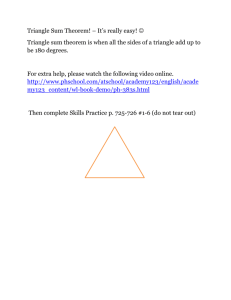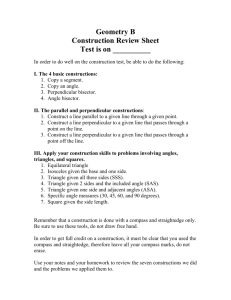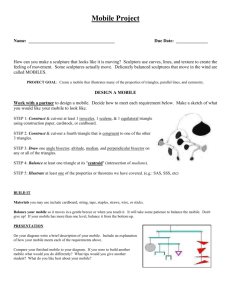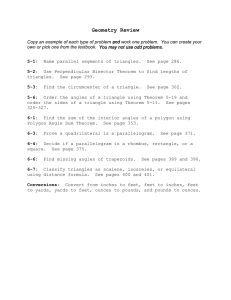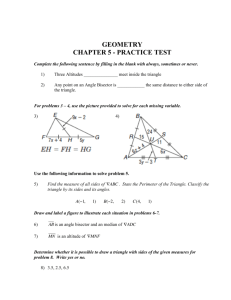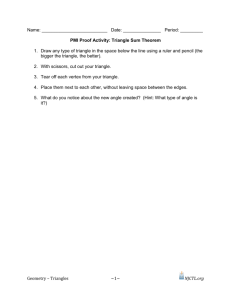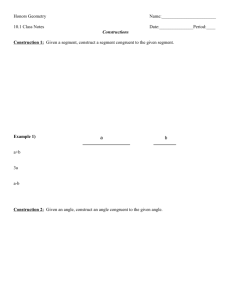Geometry Chapter 6
advertisement
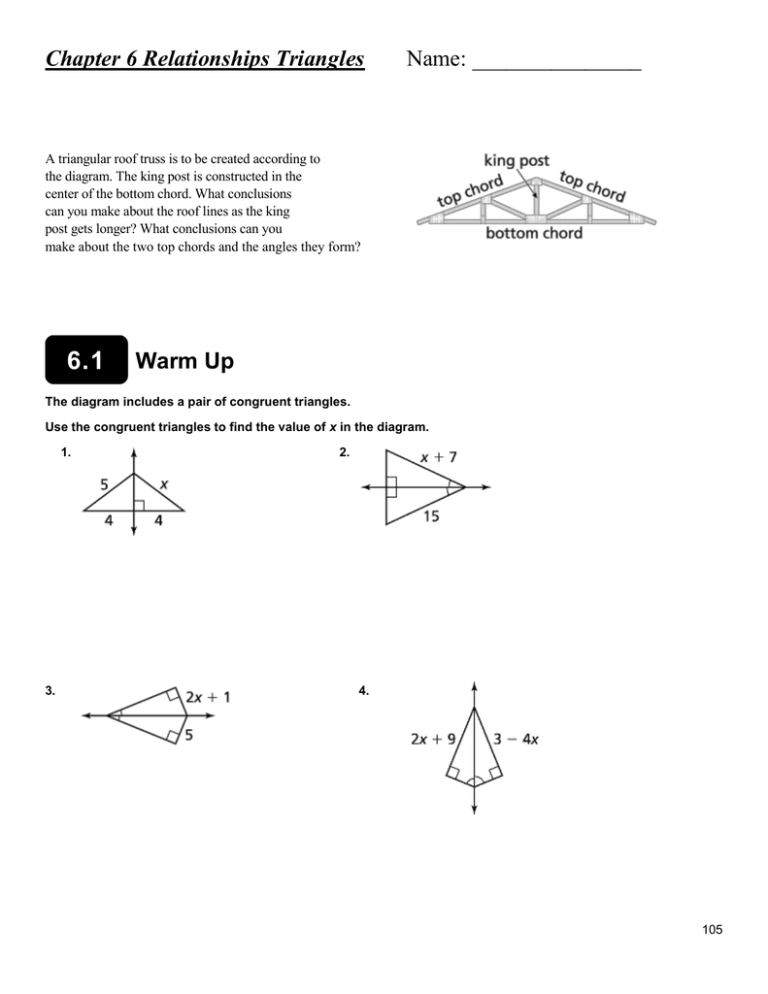
Chapter 6 Relationships Triangles Name: _______________ A triangular roof truss is to be created according to the diagram. The king post is constructed in the center of the bottom chord. What conclusions can you make about the roof lines as the king post gets longer? What conclusions can you make about the two top chords and the angles they form? 6.1 Warm Up The diagram includes a pair of congruent triangles. Use the congruent triangles to find the value of x in the diagram. 1. 3. 2. 4. 105 Section 6.1-Perpendicular and Angle Bisectors 106 6.1 Practice A Tell whether the information in the diagram allows you to conclude that point P lies on the perpendicular bisector of RS, or on the angle bisector of DEF. Explain your reasoning. 1. 2. 3. Find the indicated measure. Explain your reasoning. 4. AD 5. GJ 6. PQ 7. mDGF 8.AC 9. mLNM 10. mUTW 107 Cumulative Review Warm-Up Graph the polygon and its image after a reflection in the given line. 1. y x 2. y 2 Find the measure of the unknown angle(s) in the triangle. 1. 2. Find the value of x that makes 𝒎 ∥ 𝒏 1. 2. 3. 108 Lines of Concurrency Define: 1) Concurrent lines2) Point of concurrency- Definition Angle Bisector A bisector that divides an angle of a triangle into two congruent adjacent angles Perpendicular A segment that is perpendicular to a side of a triangle at the midpoint of the side Bisector Median Altitude Point of concurrency Drawing A segment whose endpoints are a vertex of a triangle and the midpoint of the opposite side The perpendicular segment from a vertex of a triangle to the opposite side or to the line that contains the opposite side Identify the following: 1) ______________ 2) ______________ 3) _____________ 4) ____________ 109 Points of Concurrency Name__________________________ Given the following pictures and markings, identify each of the following as (a) an angle bisector, (b) a perpendicular bisector, (c) an altitude, or (d) a median. List all that apply. 1. _____ 2. 1. 3. 2. _____ 3. _____ 5. 4. 6. 4. _____ 5. _____ 6. _____ 7. 8. 9. 7. _____ 8. _____ 9. _____ Identify each of the following as (a) an angle bisector, (b) a perpendicular bisector, (c) an altitude, or (d) a median. 10. _____ 10. 11. 11. _____ 12. _____ 13. _____ 12. 13. 110 Section 6.2-Bisectors of Triangles 111 The perpendicular bisectors of ! ABC intersect at point G, or the angle bisectors of intersect at point P. Find the indicated measure. Tell which theorem you used. 1. BG 4. PC 2. CG ! XYZ 3. PS 5. AP 6. MP Find the indicated measure. Tell which theorem you used 6. PJ 4x 8, PL x 7 7. PN 6x 2, PM 8 x 14 Find PK . Find PL. 5. LG 6x 14, NG 3x 22 Find MG and NG. 6. GL 4 x 2, GE 3x 2, GK 2 x 8 Find GJ and GE. 112 Section 6.3-Bisectors of Triangles 1. BL 12 Find BP and PL. 2. CP 16 Find PL and CL. 113 Point of Concurrency Formed by Sketch Incenter Circumcenter Centroid Orthocenter Identify the correct point of concurrency: 1) 3) 2) 4) 114 Section 6.4-Midsegment Theorem Find the values of the variables. Use formula Base = 2(Midsegment) or B = 2(M) 1. x = _____, y = _____, z = _____ x 2. x = _____ y 6 4 z x 8 10 6 4 20 13 3. x = _____ 4. x = _____ 10 5 x 5. x = _____ x+1 6. x = _____ 31 2x x 5 60° 7. x = _____, y = _____ 8. x = _____, y = _____ 5x + 11 x y 60 x + 23 3y - 9 40 2y + 6 115 Midsegments Use formula Base = 2(Midsegment) or B = 2(M) Find the values of the variables. 1. x = _____, y = _____, z = _____ 9 2. x = _____ y 6 4 8 x x 11 6 4 z 18 3. x = _____ 4. x = _____ 22 6 x x+3 5. x = _____ 6. x = _____, y = _____ z = _____ 2x 40 24 x z y 60° 7. x = _____, y = _____, z = _____ 8. x = _____, y = _____ 3x + 12 z⁰ x y 50 3y + 6 x+7 45 4y - 5 116 Section 6.5-Indirect Proof and Inequalities in One Triangle **Complete Student Journal Pages 186-188** In Exercises 1 and 2, list the angles of the given triangle from smallest to largest. 1. 2. In Exercises 3 and 4, list the sides of the given triangle from shortest to longest. 3. 4. In Exercises 5 and 6, is it possible to construct a triangle with the given side lengths? Explain. 5. 15, 37, 53 6. 9, 16, 8 7. Write an indirect proof that a triangle has at most one obtuse angle. 8. Describe the possible values of x in the figure shown. 9. List the angles of the given triangle from smallest to largest. Explain your reasoning. 10. The shortest distance between two points is a straight line. Explain this statement in terms of the Triangle Inequality Theorem (Theorem 6.11). 117 Name _________________________________________________________ Date _________ 6.5 Practice B In Exercises 1 and 2, list the angles of the given triangle from smallest to largest. 1. 2. In Exercises 3 and 4, list the sides of the given triangle from shortest to longest. 3. 4. 5. Write an indirect proof that a right triangle has exactly two acute angles. 6. Is it possible to construct a triangle with side lengths 52 x 6, 3x 80, and x2 41 if x 9? Explain. 7. The figure shows several triangles, with labeled side lengths. Which of the triangles are labeled correctly? Explain. 8. Your friend claims that if you are given the three angle measures of a triangle, you can construct a triangle that obeys the Triangle Inequality Theorem (Theorem 6.11), even if you are not given any of the side lengths. Is your friend correct? Explain your reasoning. 118 Section 6.6- Inequalities in Two Triangles **Complete Student Journal Pages 191-192** Copy and complete the statement with , , or . Explain your reasoning. 1. AC _____ DF 4. KL _____ MN 7. m1 _____ m2 2. mHGI _____ mIGJ 5. BC _____ DE 3. m1 _____ m2 6. JI _____ GH 8. mU _____ mR 119 Write and solve an inequality for the possible values of x. 9. 11. 10. 12. 13. Two sailboats started at the same location. Sailboat A traveled 5 miles west, then turned 29 toward the north and continued for 8 miles. Sailboat B first went south for 8 miles, then turned 51 toward the east and continued for 5 miles. Which sailboat was farther from the starting point? Explain your reasoning. 14. How are the Hinge Theorem (Theorem 6.12) and the SAS Congruence Theorem (Theorem 5.5) similar? How are they different? Explain your reasoning. 120
